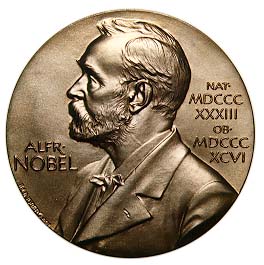Winners of the Nobel Prize bear the title Nobel Prize Laureate. A
Nobel
laureate is a person honored or awarded a prize for great
achievements, especially in the arts or sciences. A laureate is a
person worthy of the greatest honor or distinction.
The term laureate is derived ultimately from the Latin, lauretis meaning adorned with
or crowned with laurel, from laurea, crown of laurel, from the feminine
laureus, from laurel, from laurus, meaning laurel.
In modern times, a laurel wreath is constructed from the bay tree, the same plant
that yields the bay leaf used in cooking.
Why is wearing the laurel crown a symbol of honor? As a
sign of honor, the laurel crown dates from the ancient Greek practice of placing a
laurel wreath on the head of a person who wins a contest such as an
Olympic Game.
Unlike today's Nobel Prize winners, when an ancient Greek received
his laurel wreath, it was clear he was a winner. He had wrestled his
competition to the ground or jumped higher than anyone else. A crowd
saw him do it; there were plenty of witnesses; it was a concrete
achievement no one could deny.

Unfortunately, today life is more complicated; it's harder to decide who
wins contests like those for which a Nobel is awarded because the kinds of
achievements that count in the modern age are abstractions like discovering
DNA or writing the great American novel. The Prize depends not on an
objective accomplishment but only on an opinion formed by the the Nobel Prize Committee,
namely that the
achievements of the Laureate are extraordinary and important. But on what grounds
does the Committee merit the right to make such judgments? What
guarantees that its decisions are sound?
The majority of the public incorrectly sees the Award as deserved because of the Committee's says it is. Why does the
public accept the Committee's judgment seemingly without question?
Because the Committee is a very prestigious bunch.
Why is the Committee's word virtual law? In effect, the prestige carried by the Prize
validates the Prize. The honor enjoyed by a new Laureate derives from the company of other
Laureates in which
the new Laureate finds himself. The Committee awards the Prize to a
candidate because it believes his work entitles him to join the
company of other Laureates. In previous years, the Committee awarded the Prize to these
other Laureates because it believed their work entitled them to join
the company of the Laureates who preceded them, and so on, a circular
argument. But the
Committee is the agency that decided which past candidates should
receive the Prize. In awarding the Prize,
the Committee is simply
affirming its own judgment and authority, past and present.
Essentially, the Committee's authority stems from this circular process.
It's right because it was right in the past.
Granted that the Committee consults outside experts for their help and
guidance. In the last analysis, the members exercise their own opinions and
judgments. It follows that the Committee's views are not a guarantee of the level
or importance of the accomplishments of one candidate vis-á-vis
all others; the
actual achievements
of the Laureate must speak for themselves. The Prize is
not in itself the proper source of the honor; is it just a pointer to
it.
Moreover, the Committee decides what aspect of a Laureate's work
is important enough to earn him the prize. This aspect seems to change
from year-to-year with the winds and tides. For example,
in 2006 when Orhan Pamuk won, the Committee
honored him as a man "who in the quest for
the melancholic soul of his native city has discovered new symbols for
the clash and interlacing of cultures." But in 2005,
when Harold Pinter won, the Committee honored him as a man "who in his plays uncovers the precipice under
everyday prattle and forces entry into oppression's closed rooms."
Recognizing different kinds of contributions from different Laureates
is commendable because it acknowledges that different Laureates have
different things to contribute, but it smacks of comparing laureate apples with
laureate oranges.
Furthermore, the honor conveyed by the Prize turns on the judgment of the Nobel Committee, which,
by virtue of being human, is fallible. The award is decided behind closed
doors in a way that denies the public access to what goes on during the
decision-making process. In such an environment, there is room for
never-to-be-exposed behind-the-scene mistakes, political intrigue,
judgmental imbalance, or faddism.
These are some of the reasons why the Prize should not be
seen as conferring an infallible blessing on the Laureate; the dignity
it confers should not be taken as sacrosanct; and the candidates who are
passed up when the Awards are handed out should not be seen as unworthy.
No doubt, many candidates who have received the Prize merit their
Award. At the same time, how can we fail to acknowledge that worthy,
first-rate, even brilliant candidates have
not (and will never) receive the Prize. In addition, we can be sure
that the test of time will inevitably demonstrate that the life work
of some who have received the Prize is, sadly, not worthy compared
with their peers.
At base, the high regard in which the Nobel Prize is held is due to the
respect in which past Nobel Laureates are held. New Laureates bask in the
glory of their predecessors and stand on their shoulders. In the future, the Prize
will continue to confer honor to its recipients only so long as
meritorious and exemplary people continue to receive it. But who are they, really?
Shakespeare never won a Nobel Prize. But does that matter?




